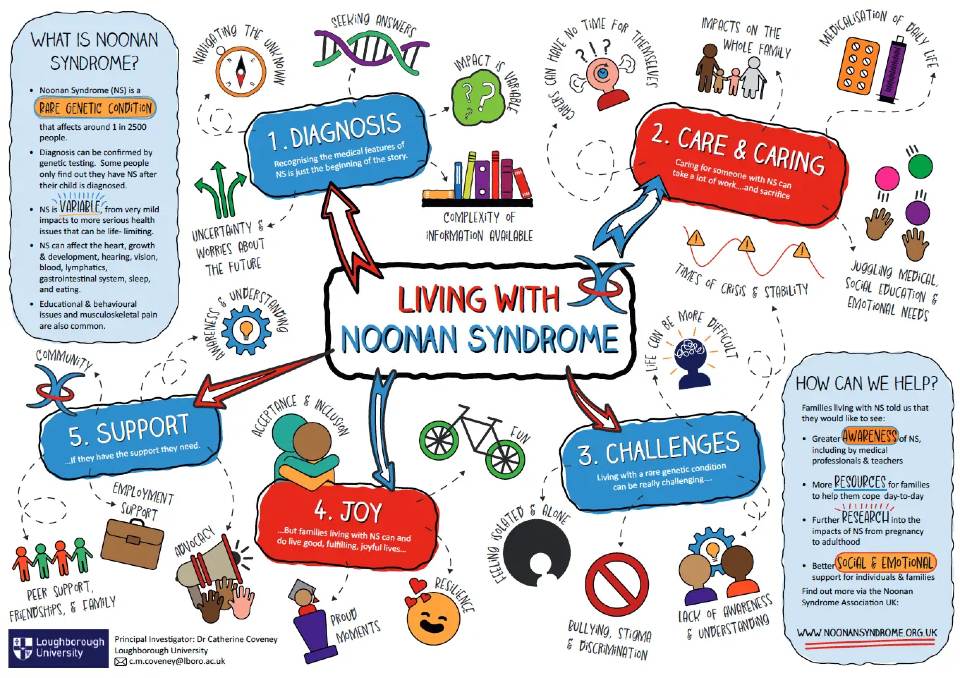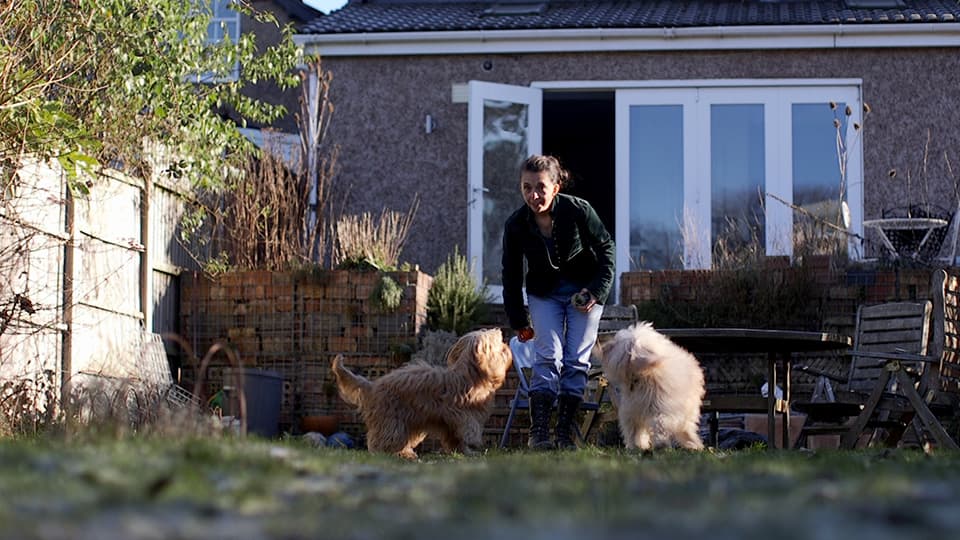Loughborough University researchers have spoken with more than 60 families from across the UK as part of a project that aims to better understand the social and emotional impact of living with Noonan Syndrome.
Research lead Dr Catherine Coveney says one of the main findings of the study, which is in collaboration with the Noonan Syndrome Association charity, is that there is a glaring lack of awareness of the condition – even among medical professionals.
“Despite increasing medical research, very often medical professionals involved in families’ care don't know much about Noonan Syndrome, if anything at all”, she said.
“Families have told us of experiences of poor support from professionals in their lives, lack of understanding about the realities of living with Noonan Syndrome, and difficulties in accessing care.
“This, coupled with the fact that teachers, social workers, family, and friends have never heard of the condition, can be really stressful for families as they feel like they are on their own.
“Noonan Syndrome is often referred to as the ‘the most common rare disorder that you have never heard of’, but we need to change that.”
What is Noonan Syndrome?
Despite being labelled as ‘rare’, Noonan Syndrome is estimated to affect between 1 in 2000 to 1 in 2500 births in the UK (the exact prevalence is unknown due to many people remaining undiagnosed).
For comparison, Down Syndrome, a wider known genetic condition, has an estimated prevalence of 1 in 1000 worldwide.
Noonan Syndrome causes a wide range of features and health problems, with the most common characteristics associated with condition being distinct facial features, short stature, and heart defects (such as congenital heart disease), which often require surgical treatment.
However, it is a highly variable condition. For some people, the impacts are mild, so much so, they may not know they have it. But for others, Noonan Syndrome can cause serious health issues that can be life-limiting.
Noonan Syndrome can be inherited (a 50:50 chance) if one or both parents carry an altered gene. It can also occur de novo (through spontaneous mutation of the gene), in which case the child can be the first in the family to have the syndrome. In some instances where the condition is inherited, parents may only discover they also have Noonan Syndrome after their child’s diagnosis.
A total of 67 families with varied experiences of Noonan Syndrome took part in the Loughborough University survey.
In addition to finding families struggle with a lack of awareness of the condition, another significant theme emerged from the survey responses: the social and emotional impacts of living with Noonan Syndrome are overlooked for both individuals and carers.
“For individuals with Noonan Syndrome, impaired mobility, pain, sleep disruptions, behavioural issues, learning difficulties, and mental health concerns significantly influence their ability to organise daily life, participate in social activities, and maintain relationships”, said Dr Coveney.
“Many say they feel excluded, isolated, and alone.”
She continued: “And this extends to the people that care for these individuals. Many families juggle managing multiple medical challenges, numerous clinic and hospital visits, and the day-to-day aspects of Noonan syndrome.
“The majority of parent carers in our study were not able to find paid employment that fits around their caring responsibilities, which can lead to financial pressures and stress. They also reported impacts of caring on their mental and physical health, and relationships.”
Dr Coveney and the Noonan Syndrome Association are calling for:
- Greater Noonan Syndrome awareness, especially among medical professionals
- Further research into the social and emotional impacts of living with the condition
- Enhanced support systems
- More social opportunities for individuals and families living with Noonan Syndrome
- Additional resources for education and awareness.
Dr Coveney and team – who are now building on the research by conducting in-depth interviews with families – are sharing their findings as part of a month-long social media campaign that aims to raise awareness of the genetic condition.
Individuals and families are sharing their experiences of Noonan Syndrome to support the online cause, which ties in with Rare Disease Day 2024 on February 29.
This includes the co-founder of the Noonan Syndrome Association Ian Legg, whose son Mark died aged 33 from health complications associated with the genetic condition.
Mark and Ian’s story
Ian says Mark lived a full life, living as independently as possible and finding joy in everything he did, despite the challenges of having severe health issues associated with Noonan Syndrome.
As well as sharing stories of Mark’s life – such as when he appeared on Channel 4’s 24 hours in A&E and captured the nation’s heart – Ian is also highlighting how important the research is for the charity he helped establish.
The Noonan Syndrome Association supports families and individuals living with the condition by providing valuable information and resources, including essential webinars hosted by medical experts, and hosting social gatherings, such as Family Days, where people can connect.
However, Ian says the charity has been struggling to organise events and expand its support offering due to a lack of funding.
“It’s so important that this research gets publicised, that medical professionals see and learn from it, that families see and learn from it, and, most importantly, that the charity has it”, said Ian.
“The findings provide direction for the charity. If we can get the money and the resources, the charity can use the research to explore different things that will support families.”
The Fay family
Karina and Terry Fay, from Essex, are also sharing their experiences in support of the online campaign.
The couple discovered at 26 weeks pregnant, after a prenatal screening test, that one of their twins, Matilda, had Noonan Syndrome.
They say the lack of awareness among medical professionals has been challenging, especially at the point of diagnosis.
“When we were given the diagnosis, we were told our daughter would never be able to eat solid food, she may be able to walk but it would be very delayed, and she wouldn’t be able to have a normal child’s lifestyle”, said Karina, “There was no mention that Noonan Syndrome could affect people differently. It was scary.
“We learnt all we did about the condition from looking things up on the internet; we found, and still find, we are the ones having to explain what Noonan Syndrome is to medical professionals. It would be nice to walk into the room and someone knows what it is.”
Dad Terry says Matilda is “thriving”, with her development not far behind her twin brother, who does not have the condition.
Though she has some health issues associated with Noonan Syndrome, Matilda is walking, eating solid foods, and doing many of the things the Fays were told she would never be able to.
The family are advocating for greater awareness and increased social support for those living with the condition, having benefited from the Noonan Syndrome Association’s Family Day after discovering the charity by chance.
Karina said: “Yes there are medical conditions associated with Noonan Syndrome – and Matilda has a lot of hospital visits – but once you start connecting with other people and families, you find that it is a wonderful genetic condition. Matilda is just incredible.”
Andrea’s story
Andrea Reid-Kelly, from Birmingham, said she felt like a “freak” growing up, until she got a diagnosis of Noonan Syndrome at the age of 16.
The mum-of-two has shared stories of navigating the world without a diagnosis and how she worries history may be repeating itself.
She suspects her teenage daughter may have Noonan Syndrome, but due to the mild symptoms and lack of testing available for Andrea’s specific gene mutation, they can’t be certain.
Andrea worries her daughter – and other people with the same gene mutation – will never get a diagnosis as she believes there is a hesitancy to fund studies into rare genetic diseases.
She says rare genetic conditions are often overlooked due to the perception that they only affect a small portion of the population. Consequently, companies invest time and money into researching conditions that impact large populations.
Andrea hopes the Noonan Syndrome awareness campaign will highlight that rare genetic conditions affect many people, and spark discussions about other conditions too.
She said: “The saying goes that one in 17 of us have a rare genetic condition, so though they’re uncommon, or ‘rare’, together they are not rare.
“The research from Loughborough University highlights difficulties we all face, whether it’s Noonan Syndrome or a different rare genetic condition.
“I hope that by raising awareness and improving things for Noonan Syndrome, one of the most common rare genetic conditions, this will fly the flag for all rare genetic conditions and benefit them too.”
The social media awareness campaign by the Loughborough University researchers can be followed on Instagram (@livingwithnoonansyndrome_) and information on the Noonan Syndrome Association can be found on the charity’s website.
Dr Coveney and team have created an information sheet that summarises the findings of the research project, which viewed online.

